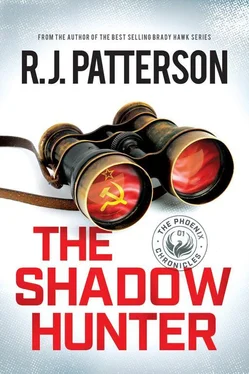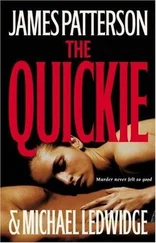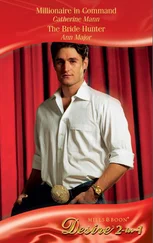Based on how loudly the doors were shutting, Hawk guessed that the man was three doors away.
“Okay, I got it,” she said. “His new name is Dimitri Sokolova, and he’s not imprisoned anymore.”
“Then how the hell am I gonna find him?” Hawk asked.
“This file just so happens to have an address for him,” Mia said. “He’s in a special group called ‘Fight Night’.”
Two doors down now.
“Text it to me,” Hawk said, his heart in his throat. “I have to go.”
He ended the call and then disconnected the device from the computer. Then he waited until he heard the next door open. When it did, Hawk sprinted down the corridor near the entrance and shouted for the man when he re-emerged from the other room.
“There you are,” Hawk said, calming his nerves as quickly as he could. “I went to the restroom. Did you place the warden’s items in the van?”
The man scowled. “I was looking everywhere for you, but you weren’t anywhere to be found.”
“I’m sorry. My mistake.”
He spun on his heels and returned to his van. In less than a minute, he was off the premises. He dialed Mia again.
“I take it you made it out,” she said.
“And in one piece, too.”
“Good,” she said. “I just sent you the address. Good luck.”
Hawk returned to his motel room to transport the delivery man a half-mile away before strapping him behind the steering wheel and removing his bindings. When he exited the vehicle, demanding to know why this had been done to him, Hawk was walking briskly along the sidewalk and never looked back.
He had an old friend to visit.
Washington, D.C.
PRESIDENT NORRIS’S RESPONSE to North Korea’s literal shot across the bow of the U.S.S. Roosevelt had been swift and harsh. At General Miller’s urging, Norris-ordered Navy jets scrambled into the air to attack a small North Korean destroyer. In a matter of minutes, the vessel sank, and the tension had been escalating ever since.
As Norris convened a cabinet meeting along with the Joint Chiefs of Staff in the situation room, he pondered if he should go through with his plan. In such a grave moment, engaging in spy craft seemed like a foolish move. But he couldn’t have someone leaking all of the inner workings of his administration, especially with the election looming. Someone was not only trying to take him out politically, but they were also trying to undermine what authority he held for the rest of the term. The former struck at his pride, but the latter would hurt the American people, which was not something Norris would ignore.
Since the sinking of the North Korean destroyer, a standoff developed in the Pacific Ocean between the U.S. and Kim Yong-ju’s troops. No more shots had been fired, but naval vessels from both countries had grown. This development had General Miller frothing to initiate more action.
“Sir, I’d like to begin by saying that I think you’re doing an excellent job of directing our military in these uncertain times,” Miller said. “I believe striking back was the right thing to do and apparently called Kim Yong-ju’s bluff.”
Norris wagged his finger at Miller. “Let’s not be so quick to declare anything definitively at this point. It’s only been a little over twenty-four hours since this all began. And I suspect our friends in North Korea aren’t inclined to let this be the end of it.”
“Their military is a house of cards,” Miller said. “We could obliterate them right now.”
“Of course we could, but just because we can, does that make it right?” The president turned toward Barbara Wheeler. “What do you think, Madam Secretary?”
“I think we need to tread lightly here, Mr. President,” she said. “Looking at this through the lens of diplomacy, I see two heavyweight fighters who’ve—”
“There’s only one heavyweight in this fight,” Miller interrupted. “North Korea is more like a fly weight fighter trying to step into the ring with a behemoth.”
Wheeler glared at Miller. “Are you finished?”
An awkward silence filled the room before she continued.
“I see two heavyweight fighters who’ve both landed the punches they hoped to in the opening seconds of the round. But for various reasons, neither wants to go on the offensive. For North Korea, it’d be great shame for Kim Yong-ju to lose to the U.S. military, which is exactly what will happen should he engage us. For the U.S., the world would view us as a bully. With nothing to gain through a military victory, I propose we consider another route.”
“I’m all ears,” Norris said.
“I think we can leverage this situation into a big win for us diplomatically as well as militarily,” she said. “First, we invite Japan in to broker peace between us and North Korea. That will score us points as far as letting another country with a vested interest in peace in that region lead the talks. Second, we make great concessions to Kim Yong-ju as well, enabling him to save face with his people and appear to drive a hard bargain. He’ll be able to boast about his negotiating skills to North Korean citizens and we’ll get the benefit of having avoided an unpopular military conflict.”
Norris placed a toothpick into his mouth, acting as if he was pondering her suggestion. The truth is he’d already made up his mind long before he entered the room. Deep down, he felt a little guilty for calling a big meeting in the situation room for a charade. But he had to make sure there wasn’t any way the cable his office was about to send could be construed as fraudulent.
“Sir, with all due respect,” Miller began, “this seems like a giant step backward to me. We have North Korea where we want them. They’re shaking in their boots, fully aware that picking a fight with us is a losing proposition. There’s no need to concede any ground to them.”
Several other generals echoed Miller’s comments, affirming his position.
Norris nodded at one of his aides, who passed out a report about a survey conducted by White House strategists.
“While you’re studying these numbers, keep in mind that our goal is to serve the interests of the American people,” Norris said. “And while I believe that keeping citizens safe is important, there are multiple ways to accomplish this that don’t include bombing the hell out of North Korea.”
One of the other generals shrugged. “Invading them would be a boondoggle, not to mention there’s little of value there. We wouldn’t get anything out of it.”
“We don’t make decisions to engage in conflict just to get something out of it,” Norris said, his eyes narrowing. “At least, that’s not how this administration is going to act. But just look at the numbers on that page, do you think the American people want to go to war with North Korea? Almost everyone seems to regard him as a narcissist who has a high level of self-importance.”
“And he also has the capability of causing great harm to the American people,” Miller said.
“Where’s the proof?” Norris fired back. “We supposedly have the greatest intelligence agency in the world, yet not a single one of them can provide us with any actionable intel that Kim Yong-ju has what he claims to have. When he gets nuclear weapons, this conversation will be entirely different. Until then, I’m not about to drag us into another conflict like Vietnam with nothing to win and everything to lose, primarily starting with the lives of American soldiers.”
Norris perused the handout indicating that more than eighty-five percent of Americans were against another conflict. He held up the paper.
“This shows that people like peace and prosperity—and they want to keep it. I’m not willing to jeopardize that on the hunch that North Korea might have nukes.”
Читать дальше












